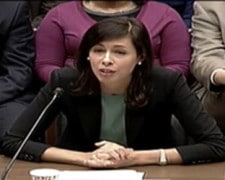By Adam R Jacobson
RBR + TVBR
In just 10 days, the Federal Communication Commission will likely vote on a plan drafted by Chairman Tom Wheeler that he believes is designed to create more competition, and consumer choice, in the set-top box markets.
 Free from the rental fee obligations millions of U.S. cable television customers face, an app-based box – as proposed by Wheeler – would revolutionize how pay-TV is brought into homes and business across the nation.
Free from the rental fee obligations millions of U.S. cable television customers face, an app-based box – as proposed by Wheeler – would revolutionize how pay-TV is brought into homes and business across the nation.
Just what’s in Wheeler’s proposal?
That’s exactly what key members of the House of Representatives are asking, and they want everyone in the U.S. to have access to the full text of Wheeler’s plan.
In a letter sent to Wheeler Friday, Energy and Commerce Committee Chairman Fred Upton (R-Mich.), Communications and Technology Subcommittee Chairman Greg Walden (R-Ore.), House Judiciary Committee Chairman Bob Goodlatte (R-Virginia), and Judiciary Committee Ranking Member John Conyers (D-Mich.), asked for full transparency regarding his set-top box proposal.
“While much remains unknown, what is clear at this point is that the proposal would benefit from public process,” the House of Representative leaders write. “Absent a public vetting of the commission’s proposal it is unclear what the commission is planning, let alone its impact. Without further delay, we request that you release the text of your proposal.”
The four Congressmen added that Wheeler’s proposal “raises issues of significance to both our Committees, and we believe the Commission should release text in order to allow all stakeholders to meaningfully discuss the implications of the proposal.”
Meanwhile, a Los Angeles Times opinion piece written by Wheeler and published Sept. 8, in addition to a fact sheet released by the FCC, on the set-top proposal “raise new questions rather than resolve questions posed in the Notice of Proposed Rulemaking,” Upton and Walden said in a co-written statement. “Unfortunately, this behavior is not new and this aversion to transparency has come to define the FCC.”
In a separate letter sent to Wheeler on Friday, bipartisan concern over the set-top box proposal was expressed by eight Democrats and eight Republicans in the House of Representatives.
“While we appreciate your decision to adopt a revised ‘application’ based framework for the proposal based on stakeholder comment, we are concerned that the proposal under circulation does not adequately address comments raised by the U.S. Copyright Office,” the House members write. “We share your support for innovation in the set-top box marketplace, but proceeding in a way that abrogates the legitimate interests of copyright owners will not achieve this result.”
Signees of the letter include California Reps. Brad Sherman, Adam Schiff, Ted Lieu, and Judy Chu; Pennsylvania Republican Tom Martino; and Florida Reps. Ted Deutch and Alcee Hastings.
In their concluding paragraph, the House members also called on Wheeler to reconsider the Sept. 29 vote and instead publish a full version of the proposal.
WHITE HOUSE ON BOARD, ROSENWORCEL IS NOT
The Obama administration came out in support of the FCC’s effort to open up set-top boxes to competition in April. Now that Wheeler’s plan is in play, the White House on Friday (Sept. 16) reiterated its support.
As reported in Morning Consult, Jason Furman, chairman of the White House Economic Council of Advisors, noted in a speech on antitrust economics and competition policy in Chicago that Wheeler is “actively listening to stakeholders involved to improve the proposal.” He added that Wheeler is “charting out a responsible way to address their meaningful concerns while being responsive to Congress’s explicit directive to ensure a healthy set-top marketplace.”

When the vote is cast, a 3-2 party line vote against the proposal could be a real possibility. With Republicans Michael O’Rielly and Ajit Pai likely dissenters, Democrat Jessica Rosenworcel is a definite “no.”
Speaking at the July 15 Senate Commerce Committee “Oversight of the FCC” hearing, Rosenworcel said she could not support the set-top box proposal as it is currently written.
“I have some problems with licensing, the FCC getting a little bit too involved in the licensing scheme here,” she said. “I just don’t think we have the authority.”
With growing voices of dissent from both sides of the Congressional aisle, Wheeler remains confident that his proposal is akin to what happened to telephones.
In an interview with NY1/Time Warner Cable News Washington, DC reporter Geoff Bennett conducted Sept. 16, Wheeler reiterated his belief that his proposal is a positive response to laws that say consumers are supposed to have a choice, but only have “the set-top box that is forced on them by their cable company.”
He continues, “Because what comes with choice? Better service, innovation, lower prices. We saw this happen with telephones. You used to have to lease only AT&T’s telephone. That rule got changed, and what happened? Phones got better and phones got cheaper. Same thing’s going to happen here.”
In response to concerns over the FCC becoming “an arbiter of licensing contracts,” Wheeler replies, “I think the whole licensing issue is an inside-the-beltway worry. First of all, we’re not going to second guess licensing. We’re not going to engage in meddling in contracts. But we are going to make sure consumers have choice, that consumers have an alternative to keep from paying the high prices they have to pay month after month after month for a box they don’t need.”
Finally, asked if he would delay a vote on the proposal, Wheeler says, “I hope not. Let’s stop and think about it. Every month, consumers pay $1.6 billion. A billion, 600 million comes out of consumers’ pockets every month that we delay. Consumers ought to have the choice to lower their cable bills.”
Thus, the chance for the public to “stop and think about it” before the FCC casts its vote looks dim.
RBR + TVBR





